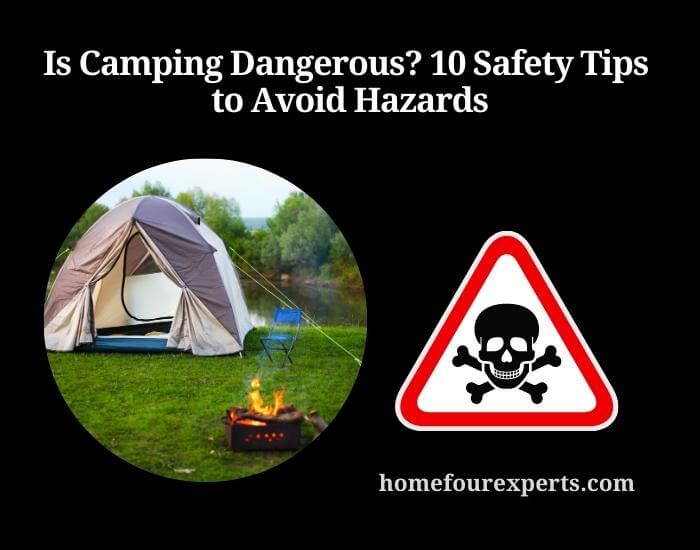When did you last go camping? Is it this summer? Or the previous one??
Camping is fun, right? But what about the hazards related to it? If you take specific measures, you can avoid that because spending quality time with your loved ones shouldn’t be hectic. And, you don’t want to miss this fantastic experience at all, do ya?

It is quite exciting to be out in the forest, sleeping in the tent, cooking over the campfire. Spending some time in nature refreshes your mind. Unfortunately, we don’t have the time and chance to afford it all the time. So, whenever you get the opportunity, don’t miss it. It is an excellent way to spend time with family and friends.
Here we are trying to give you a glimpse of the things that can cause you trouble during the camping period and provide solutions. Also, some extra tips that would help you to make this trip a memorable one!

Is Camping Dangerous?
Since you’re camping, you’re exposing yourself to the wilderness. It can be somewhat dangerous. And if it is your first time, you have to be extra careful because many uncertainties can happen.
If you’re planning your next camping trip, read the following precautions you can take. These measures can help you to avoid some common dangers when in the wilderness. Give it a quick read and try to follow the guidelines-
10 Safety Tips for Hazard-free Camping Experience
Safety Tip 1: Avoid Bad Weather
Weather is unpredictable. No matter how many times you check the forecast, it can still create a hazard all of a sudden. Nasty weather is troublesome. Whether it is a cyclone, blizzard, or stormy weather, it can ruin your mood in the first place. Lightning is one of them too.
First of all, try to camp in suitable weather. Research the climate of the area you’re heading to. Study the weather of the camping site during the staying period.
If you camp during the rainy season, set up the camp far from water and low-lying areas to avoid dangerous flash floods. Get yourself dry fast and change wet clothes immediately if you get drenched in the rain, fall into the water, or sweat continuously. Then find yourself in a warm place as soon as possible and wrap in a blanket.
Be conscious of extreme cold or heat because cold summer nights, sudden downpours, or even sweaty hikes can cause you hypothermia. It’s better to be prepared for all possibilities.
Safety Tip 2: Be Aware of Fire Hazards
The fire you use for cooking or warming up can cause you a massacre if you’re a little bit inattentive. Also, it can spark a fire in a hastening. Remember, your wise consideration can prevent forest fires. So, what can you do?
Make sure you set up your camping tent at a distant place from the fire. Put away the flammables, like- paper, liquid, or clothes from the fire. Use rocks to build a barrier around the fire so that it has a lesser possibility to spread. Carry a portable fire extinguisher.
Safety Tip 3: Avoid Bears and Wild Animals

In many popular camping areas like Yosemite, Yellowstone, and Banff National Parks in the U.S. and Canada, bears are seen around. Eat your food in the designated spaces in those parks having bear activity. Also, you can store your meals there too!
Bears have a seven times stronger sense of smell than bloodhounds. Keep your food and leftovers in a bear canister. But if you don’t have one, you can just hang it on a tree far from the reach of animals and at least a hundred feet away from your campsite. Try to minimize the odor from food or hygiene products.
Make enough noise to keep wild animals away during your hike or while staying at the campsite. The sound will alert them about your presence and will keep them out.
Human waste attracts bears. Set up the bathroom away from camp. Put the litter in an odor-proof bag.
Safety Tip 4: Keep Safe from Poisonous Plants and Wild Berries
Some certain plants and berries are poisonous. Don’t try out the berries that are unfamiliar to you. Because some of them can lead you to severe illness.
Maybe you’d love to spread your hands and run wild. But wait! Be careful of the poison ivies, poison oaks, and poison sumacs. You can even get a poison reaction by just touching the plant. The resin produced by the plant is sticky. So, it is easy to contact when someone passes by it.
If you come in contact with any poisonous plant, wash immediately with cool water and soap. Use calamine lotion or hydrocortisone cream to reduce the itching.
So, you shouldn’t touch unknown trees and forget about eating wild berries if you want to be in good condition on your camp days.
Safety Tip 5: Keep Mosquitoes Away
These little devils can make your time a lot worse. If you camp near a lake or slow-moving water, there might be bugs or mosquitoes. That is a massive problem for peace of mind. Also, ticks and mosquitoes carry diseases like malaria, dengue, Lyme diseases, etc.
So, to minimize the risk, select a site away from the water body—possibly where a breeze is stirring. Use insect repellent containing picaridin or DEET to protect yourself from bug bites and ticks. Reapply when you’re sweating or after coming out of water.
Inspect your bed before sleeping. If you find any tick burrowed into your skin, remove it immediately. Consult your physician.
Safety Tip 6: Food Safety and Clean Environment
Try to balance your diet. Don’t just rely on carb-heavy foods; balance the meal with healthy proteins and fats instead.
Food Safety While Camping
You should follow the food safety principles. Avoid cross-contamination. Maintain the temperature for cooked and raw foods. Remember that the “danger zone” is between 40°F and 140°F. Bacteria multiplies within that temperature.
Don’t forget to wash your hands before eating. Create a handwashing station if necessary.
Drink Safe Water
No matter how tempting that flowing water looks, it might still be teeming with bacterias and parasites. You don’t want to get sick, do you?
Keep it clean and tidy. Bacteria spread faster in a dirty/ unclean environment. Carry hand sanitizer, soap, and clean towels. Wash the utensils and surface before preparing and eating food.
Keep the site as clean as possible. Keep the garbage in a bin and keep it covered. Reduce plastic and other pollution.
For avoiding foodborne illness and outdoor food safety, check out this manual from the FDA.
Safety Tip 7: Protect Against Carbon Monoxide Poisoning
Carbon Monoxide gas is considered a silent killer. It’s a tasteless, odorless, and colorless gas that creates poisonous fumes in a suitable environment.
It is a deadly gas. Incidents associated with carbon monoxide poisoning took place at a campsite in Georgia in March 1999. From the year 1990 to 1994, this gas caused thirty fatalities on average per year reported at various camps in the US.
Emitted carbon monoxide gas can build up in poorly-ventilated places like- tents, also semi-enclosed spaces like RVs and campers.
So, don’t use a camp stove or cooking device to heat your tent or camper. Ventilate your tent while you’re heating it to prevent carbon monoxide build-up. It may look counterintuitive, but it’s important to do that.
Safety Tip 8: Use Sun Protection
Wear sunscreen even in cloudy weather. Use a sunscreen that covers both UVA and UVB radiation protection. Apply at least once every two hours. Try to apply it 15 to 30 minutes before going out in the sun.
Water and sand reflect the damaging rays of the sun that increases the chance of getting a sunburn. So, be careful when you’re around.
Use a hat and tightly woven long sleeve dress with long pants when necessary to be in the sun. You can also wear UV protective dress that can easily be found online. Wear shades with UV absorption formula and wear a cotton scarf around your neck.
Limit your sun exposure time between 10 AM to 4:00 PM. There’s an easy technique you can apply. If you find your shadow shorter than your height, consider the sun ray is harmful. Keep babies away from the sun that are younger than six months.
Lastly, be extra careful if you are sensitive to the sun or taking special medications.
Safety Tip 9: Avoid Water-related Illness and Injuries
Do Not swim alone. Do not forget to wear a life jacket if you want to ride any water vehicle.
Check the temperature before diving into the water. Make sure the water is clear. Check if there is any sign board concerning the fact related to water.
Always drink Safe Water either by filtering or boiling it when you collect it from nature.
Take a shower after swimming. Don’t swim keeping your mouth open. It could make you ill by contacting the organisms in the water.
Take up-to-date vaccinations and receive camp physicals.
Safety Tip 10: Campsite Selection
Choosing the right spot for camping can be a great advantage. Near the trail or beside the water body is not a great site for camping.
Select a place around 200 feet far from them. Try to stay out of sight of other hikers and don’t block the wildlife’s path to the water. And of course, know your surroundings.
What Kinds of Wildlife Can Be Dangerous While Camping?
The types of wildlife that can be dangerous while camping varies depending on the region and include large predators such as bears, wolves, mountain lions, and coyotes. Smaller, but still potentially dangerous animals include venomous snakes, spiders, and scorpions. Additionally, some animals may carry diseases, such as ticks, raccoons, and bats.
Are There Any Natural Hazards to Avoid While Camping?
Yes, some natural hazards to avoid while camping includes extreme weather conditions, such as heavy rain, lightning, high winds, and extreme temperatures; flash floods and mudslides; dangerous wildlife; and hazardous plants, such as poison ivy or stinging plants. It is also important to be aware of the risk of fire, as well as any potential hazards posed by the environment, such as steep slopes, deep water, and unstable ground.
Conclusion
Enjoy the toasted marshmallows, the warming invitation of the campfire, the smell of the wilderness, a closer look at wildlife, and what not to love.
Take time to commune with nature. But take precautions before heading into the woods. Make your summer vacation easier with ahead planning. Get help when necessary. Keep calm and enjoy the serenity of nature. Lastly, conduct the required research and use your best judgment.
Relevant Resources:
About This Writer

Guys, I am Camila Avery and I love to help my mom to do indoor & outdoor activities. As a lady, I have passed my time on gardening, home improvement, and personal or self-care. I have acquired some degrees in outdoor recreation, beauty, and hair care. It is not easy to work with top-level professional beauty experts. But, I got that opportunity and experimented with different hair extensions, hair colors, and cuts.